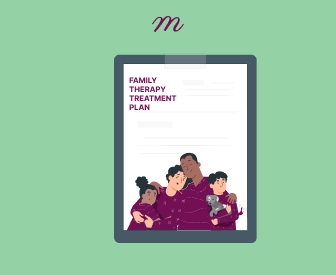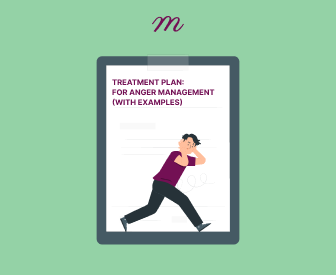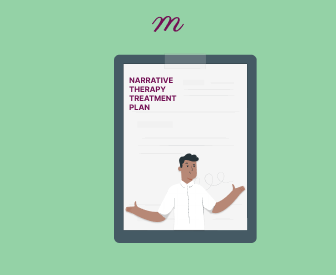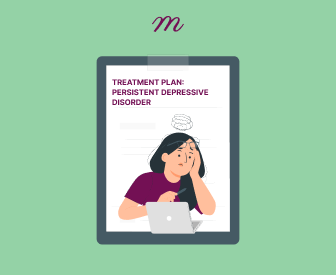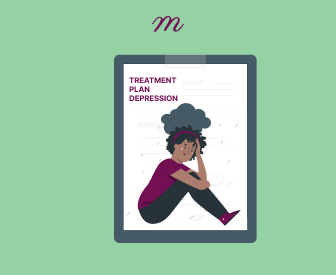Have your progress notes written for you automatically
Mental health outcome measures are valuable instruments used to assess the progress of individuals' mental well-being. These measures effectively capture a range of metrics, including various aspects of client functioning, symptomatology, and treatment experiences. Such assessments capture baseline data at the commencement of services, as well as progress documented as support continues.
What Are We Talkin’ About?
Whether making big changes to our lifestyle or seeking support for mental health concerns, keeping an eye on how far we've come is important.
I always start by telling my clients: “If you want to see how far you've come, it helps to know where you started.”
And staying on course takes regular check-ins to track your progress. This is true for any personal growth effort, whether changing your eating habits to feel better physically, practicing relaxation techniques to manage stress, or seeking support for mental health challenges like anxiety.
That's where outcome measures come into play. YES, YOU ARE RIGHT. That’s what we’ll be talking about: Outcome Measures in Mental Health.
Let us briefly set the stage. Mental health practitioners use brief surveys, checklists and worksheets to monitor how clients are doing over time. These give both the client and the provider valuable feedback. They paint a fuller picture of changes in different parts of the client’s life, from symptoms to coping skills.
Tracking progress this way has been a key part of quality mental healthcare for a long time. Outcome measures serve many purposes. They help tailor your care plan and show what's working best. Sharing results also demonstrates to funders the real difference being made, which supports continued access to services via CPT codes (96127, 96136, 96138, etc.)
Luckily, outcome tracking can happen in all kinds of settings, from large hospitals to small private practices. No matter where your wellness journey takes you, keeping regular check-ins on the metrics that matter most helps both you and your support team stay guided toward the destination of improved well-being.
Now, Let’s Delve In: What Are Outcome Measures?
In behavioral and mental healthcare settings, outcome measures are crucial evaluation tools that help determine the true impact of a service or intervention on a patient's overall mental well-being and quality of life. As established by the Donabedian model, outcome measures represent the most important of three healthcare quality indicators – working alongside structural and process measures.
Mental health issues can manifest and develop in highly individualized ways, influencing a client's functioning across various domains like relationships, daily responsibilities, physical health, and emotional state. For example, someone experiencing depression may struggle with waking up each morning, connecting with friends/family, sleeping issues, and persistent feelings of sadness weighing them down.
Mental health outcome measures provide a way to comprehensively track changes in a client's symptoms, adaptive abilities, and treatment experiences over time. They capture quantitative metrics that illustrate progress – or lack thereof – in key areas impacted by one's mental disorder. These areas assess domains like social support systems, mood symptoms, coping mechanisms, and self-care.
Outcome tools should be administered at baseline, and then routinely throughout the treatment process (whether weekly, bi-weekly, or monthly).
To effectively evaluate a client's journey, the measures must:
1. accurately reflect their specific challenges 2. 3. be sensitive to nuanced changes 4. 5. allow for direct comparisons based on treatment type, setting, and client population (e.g. adolescents). 6.
Properly selected outcome measures are vital for ensuring behavioral healthcare services meaningfully enhance well-being and functionality.
Process vs. Outcome Measures
Process measures examine the specific steps, actions, and clinical activities that comprise a patient's treatment journey. They track what is actually being "done" and delivered, such as the number of therapy sessions, medications prescribed, lab tests ordered, etc.
While process measures provide insight into adherence to clinical guidelines, they don't illustrate the real-world impacts on a patient.
In contrast, outcome measures assess the changes, effects, and results that occur as a direct result of the treatment processes. They evaluate what ultimately "happened" to key indicators of the patient's mental health and functioning following clinical interventions. Did mood symptoms improve? Stress levels decrease? Relationships strengthen? Outcome measures quantify a patient's progress across multiple areas affected by their mental disorder.
Where process measures focus inward on service delivery steps, outcome measures cast an outward gaze – scrutinizing whether those efforts successfully influenced what matters most, the patient's wellbeing.
Both have crucial roles to play, but outcome data represents the truest picture of treatment impact and quality of care.
The Importance of Measuring Outcomes in Mental and Behavioral Healthcare
The Joint Commission on Accreditation of Healthcare Organizations (JCAHO) outlines several key reasons why measuring treatment outcomes is so important in mental and behavioral healthcare. Some of the main benefits include:
1. Clinicians are able to determine if the interventions provided are truly having a positive impact on clients and achieving the intended therapeutic goals. 2. 3. Tracking clinical progress allows practitioners to identify any clients who may be at risk for poorer outcomes so additional support can be provided to prevent treatment failure. 4. 5. Outcome measurement provides patients with an objective way to evaluate their progress throughout the course of care in a quantifiable manner. 6. 7. Longitudinal assessment gives providers valuable insight into what treatment approaches are most effective or may need adjustment based on client response and feedback over time. 8. 9. Higher quality care and improved clinical outcomes can result from regularly incorporating outcomes data into treatment planning and decision-making. 10. 11. Generating real-world evidence of what interventions are working also helps address rising healthcare costs by demonstrating the value certain practices provide. 12. 13. Most importantly, outcome measures directly answer the essential question – is this treatment working? 14.
Both behavioral health professionals and clients can contribute to tracking progress. Patient-reported outcomes are particularly important given the sometimes invisible nature of mental wellness changes over time.
Regular administration of valid outcome measures ensures the treatment being delivered is truly benefitting those seeking help in achieving their goals.
Types of Outcome Measures
Different types of outcome measures are utilized to assess the effectiveness of mental health interventions.
Objective measures focus on concrete evidence of progress and include tools such as symptom severity scales and physiological indicators. These rating scales, like the PHQ-9 for depression or the GAD-7 for anxiety, provide a quantifiable measure of the impact of interventions.
On the other hand, subjective outcome measures offer valuable insights from the patient's perspective. They involve self-report questionnaires and patient satisfaction surveys that capture subtleties that objective measures alone may not fully capture.
Clinician-rated measures involve assessment tools that rely on the expertise of clinicians. These measures include observation-based assessments, clinical interviews, and other comprehensive tools. They provide a holistic understanding of the patient's journey and help clinicians gain a deeper insight into their condition.
Looking at outcome measures from a different perspective, they can be categorized into various types based on the aspects they focus on.
These types include measures related to:
1. wellbeing and multidimensional health 2. 3. quality of life 4. 5. recovery 6. 7. cognition and emotions 8. 9. relationships 10. 11. life satisfaction 12. 13. general functioning. 14.
Specifically, outcome measures can assess clinical outcomes by tracking changes in symptoms for specific diagnoses. For example, the Patient Health Questionnaire 9 (PHQ-9) is used to measure depression, the Generalized Anxiety Disorder 7 (GAD-7) for anxiety, and the Posttraumatic Stress Disorder Checklist (PCL-5) for PTSD.
In addition to diagnosis-specific measures, there are global mental health status measures that are not tied to a specific diagnosis. These scales, such as the Pediatric Symptom Checklist, the Health of the Nation Outcome Scales (HoNOS), the Daily Living Activities Scale (DLA), or the Outcome Questionnaire-45 (OQ-45), provide a broader assessment of mental health.
Furthermore, treatment-specific measures are also available to evaluate the effectiveness of specific interventions. For example, the Cognitive Fusion Questionnaire (CFQ) is used for Acceptance and Commitment Therapy (ACT), while the Difficulties In Emotion Regulation Scale (DERS) is employed for the treatment of emotion dysregulation.
Examples of Outcome Measures in Mental Health
Table 1: Adult Symptom Rating Scales for Core Outcome Measures
| Measure | Domain | Number of items |
|---|---|---|
| PHQ-9 | Depression | 9 |
| Altman Scale | Mania | 5 |
| GAD-7 | Anxiety | 7 |
| PCL | PTSD | 20 |
| PDSS_SR | Panic Attacks | 7 |
| Audit-C | Alcohol | 3 |
| DAST-10 | Drug Abuse | 10 |
| PHQ-15 | Somatization | 15 |
Table 2: Adult Multi-Diagnostic Substance Abuse Outcomes Measurement
| Measure | Domain | Number of items |
|---|---|---|
| Substance Abuse Outcomes Module | Substance Abuse | 22 |
| Brief Addiction Monitor (BAM) | Substance Abuse | 17 |
Table 3: Adult Functional Status Rating Scales for Core Outcome Measures
| Measure | Domain | Number of items |
|---|---|---|
| Functional Outcomes Survey 20-Item Short Form (SF-20) | General medical and mental functional status | 20 |
| Daily Living Activities (DLA-20) | Functional outcomes | 20 |
| WHO Disability Assessment Schedule 2.0 | Covers (6) domains of functioning (cognition, mobility, self-care, getting along, life activities, participation) | 12 and 36 item versions |
Selecting the Right Outcome Measures in Mental Health
If you're feeling overwhelmed by the abundance of mental health outcome measures available, the Kennedy Forum has curated five concise lists of core measures. These measures have been validated and are specifically relevant to different populations, diagnoses, and general concerns. When choosing which measures to use, it's important to consider their feasibility and how well they illustrate your objectives.
Taking the time upfront to define your goals and strategically select outcome measures will prove beneficial. This approach ensures that your practice focuses on measures that are scientifically validated and hold personal significance for both you and your clients.
If you ever find yourself in need of assistance, remember that Mentalyc is here to lend a helping hand. Our dedicated team is committed to providing the support you need for all your checklist and form requirements. Our doors are always open, ready to welcome you with open arms. Whether you prefer to reach out to us through a message or a phone call, we're just a moment away!
References
- American Psychological Association (APA) – Outcome Measures in Mental Health: https://www.apa.org/practice/guidelines/outcome-measures
- Mental Health America – Measuring Mental Health Outcomes: https://www.mhanational.org/measuring-mental-health-outcomes





